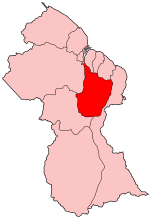Upper Demerara-Berbice
| Upper Demerara-Berbice Region 10 | |
|---|---|
| Administrative Region | |
 Map of Guyana showing Upper Demerara-Berbice region | |
| Country | Guyana |
| Regional Capital | Linden |
| Area | |
| • Total | 17,040 km2 (6,580 sq mi) |
| Population (2012 census) | |
| • Total | 39,452 |
| • Density | 2.3/km2 (6.0/sq mi) |
| [1] | |
Upper Demerara-Berbice (Region 10) is a region of Guyana, bordering the regions of Essequibo Islands-West Demerara, Demerara-Mahaica and Mahaica-Berbice to the north, the region of East Berbice-Corentyne to the east, and the regions of Potaro-Siparuni and Cuyuni-Mazaruni to the west.
It contains Guyana's second largest city, Linden, with other towns including Ituni, Kalkuni, Kwakwani, Kurupukari, Rockstone and Takama.
Kimbia is the very first training center to house the Guyana National Service. The Pioneer Corps was started in 1974, with the establishment of Kimbia Center on the Berbice River. Kimbia is located in the Ebini Area, very close to the Ebini Agriculture Station.
Population
The Government of Guyana has administered three official censuses since the 1980 administrative reforms, in 1980, 1991 and 2002.[2] In 2012, the population of Upper Demerara-Berbice was recorded at 39,452 people.[3] Official census records for the population of the Upper Demerara-Berbice region are as follows:
- 2012 : 39,452
- 2002 : 41,112
- 1991 : 39,608
- 1980 : 38,641
Communities
(including name variants):
- Attai (Attai Village)
- Bartica
- Christianburg
- Cockatara Village
- Ebini
- Ebini Downs
- GNS Kimbia
- Hitia (Hittia Settlement)
- Hururu
- Ituni (Ituni Townsite, Itoni Township)
- Kalkuni
- Kokatara Village
- Kumaka (Coomacka)
- Kurupukari
- Kwakwani
- Lancaster
- Linden
- Mackenzie (McKenzie)
- Malali
- Masabona
- Noitgedacht
- Paradise
- Pubu
- Rockstone
- Sand Hills
- Takama (Tacama)
- Takama Battle School
- Urisirima
- Watuka (Watooka Village)
- Wiribisirikanali
- Wismar (Wisemar)
- Zion (Sion)
References
- ↑ Macmillan Publishers (2009). "Administrative Regions - 8, 9 and 10". Macmillan Junior Atlas: Guyana. Oxford: Macmillan Caribbean. p. 37. ISBN 9780333934173.
- ↑ Beaie, Sonkarley Tiatun (19 September 2007). "Chapter 3: National Redistribution and Internal Migration". 2002 Population and Housing Census - Guyana National Report. Bureau of Statistics. p. 51. Archived from the original (PDF) on 2 September 2012. Retrieved 29 August 2012.
- ↑ Beaie, Sonkarley Tiatun (19 September 2007). "National Population Trends: Size, Growth and Distribution" (PDF Download). 2002 Population and Housing Census - Guyana National Report. Bureau of Statistics. p. 25. Retrieved 29 August 2012.
Coordinates: 5°16′09″N 58°16′01″W / 5.269126°N 58.267074°W